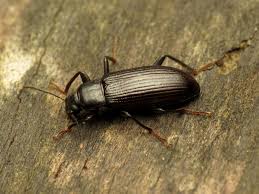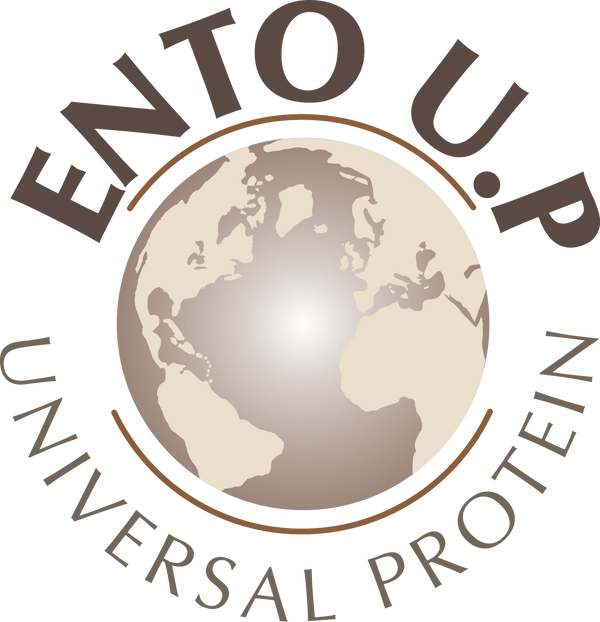
Mealworms: From Farm to Plate
If you’ve ever spent any time on our Facebook page, you’ll have noticed that sustainability is a big deal for us. Earlier this year we won an award for promoting sustainability here in Worcestershire and we’ve made it our business to help educate and inform others to help them adopt more sustainable practices too.
The key to our sustainable approach has been taking the time to explore innovative food sources that will bring benefits not only to ourselves but also to our animal companions as well, and we discovered that a tiny seemingly insignificant insect could be the answer to all our problems.
As you’ve probably realised by now that tiny insect was the mealworm - a fascinating and versatile creature that offers a myriad of benefits for eco-conscious consumers and their furry, feathered, or scaled friends.
Here at Ento U.P our mealworm farm is dedicated to the principles of organic and sustainable practices. We are taking small steps to try to change attitudes towards insect food sources to provide alternative options for a more healthy and sustainable lifestyle.
What is a Mealworm?
Mealworms, scientifically known as Tenebrio Molitor, are the larvae of darkling beetles. These unassuming insects, with their golden-brown color and segmented bodies, play a remarkable role in the ecosystem.
Natural Habitat and Farming
Mealworms are found in many parts of the world, but particularly in regions with temperate climates. They inhabit decaying wood, leaf litter, and other organic matter. This natural disposition to consume and break down organic matter is what makes them a superb choice for farming.
The 4 Life Stages of a Mealworm
Mealworms undergo a captivating life cycle consisting of four primary stages: egg, larva (mealworm), pupa, and adult beetle. Each stage has unique attributes that contribute to the nutritional value and sustainability of these remarkable insects.
1. The Egg Stage:
- The mealworm life cycle begins when adult darkling beetles lay tiny, oval-shaped eggs.
- These eggs are typically laid in dark, sheltered areas and hatch within 4-19 days.
- Nutritional Value: Eggs are not typically consumed as a standalone food source, but they are crucial for the reproduction and continuation of the mealworm population.
2. The Larval Stage (Mealworm):
- After hatching, the larvae, commonly referred to as mealworms, go through several growth stages.
- They are worm-like in appearance, with a segmented body and a hard exoskeleton.
- Mealworms voraciously feed on organic matter, which enables them to grow rapidly.
- Nutritional Value: Mealworms at this stage are rich in protein and healthy fats. They are the most commonly consumed form of mealworms and are used in various pet diets and human food products.
3. The Pupa Stage:
- When mealworms reach maturity, they enter the pupa stage, during which they undergo a remarkable transformation.
- The pupa resembles a white, non-mobile, and slightly curved form.
- This stage typically lasts around 7-14 days, and within it, the mealworm metamorphoses into an adult beetle.
- Nutritional Value: While pupae are not commonly consumed, they play a vital role in the mealworm life cycle and ecosystem balance.
4. The Adult Beetle Stage:
- Once the pupa stage is complete, a fully formed darkling beetle emerges.
- These beetles are characterized by their dark coloration, hardened wings, and a more elongated body.
- Adult beetles are primarily focused on reproduction, laying eggs for the next generation.
- Nutritional Value: Adult beetles are not typically consumed for their nutritional value but are crucial for maintaining the mealworm population.
Did you know that Mealworms are natural recyclers too? They really are nature’s mini superheroes!
How Ento Up is Embracing a Zero-Waste Philosophy with Mealworm Farming
Here at Ento U.P we love that our mealworms are zero-waste producers. This is how they do it:
1. Efficient Organic Matter Consumption: Our mealworms go crazy for organic matter. From kitchen scraps to agricultural byproducts, they eagerly devour a wide range of materials. By doing so, they help reduce organic waste that would otherwise end up in landfills, producing harmful greenhouse gases.
2. Transforming Scraps into Valuable Nutrients: Not only do mealworms reduce waste, but they also convert this organic matter into highly valuable nutrients. The process of breaking down materials results in the creation of nutrient-rich frass, which is the waste product of mealworms. This frass is a natural fertiliser and soil conditioner, adding essential nutrients to the soil and improving its quality. Our EntoGrow Organic Fertiliser is available to buy in different sizes and also as a tea - try it out in your garden and see the impressive results it yields for yourself!
3. Sustainability in Practice: Mealworm farming epitomises sustainability in action. Our insects require very little space and resources to thrive, making them highly sustainable. They also have a significantly lower environmental impact compared to traditional livestock farm requiring less water and emitting less greenhouse gas emissions.
We love mealworms!
Of course our favourite thing about mealworms is that they can be used in so many ways:
- Live Mealworms: Live mealworms serve as a natural food source for a variety of animals, including reptiles, birds, and fish. Their high protein content makes them an ideal choice for pet diets, and their consumption can stimulate natural hunting behaviors.
- Dried Mealworms: Dried mealworms are versatile and can be incorporated into both pet treats and high-protein human snacks. They provide a convenient and sustainable source of protein, vitamins, and minerals for a wide range of dietary needs.
- Organic fertiliser: Mealworms contribute to efficient composting by breaking down organic matter and converting it into valuable compost which we sell in our shop. The resulting mealworm frass can be used to enrich soil, enhance plant growth, and close the loop in the natural recycling process.
Whether you're seeking a sustainable protein source or an eco-friendly composting solution, mealworms provide an exceptional opportunity to minimise waste and make a positive impact on the environment.
